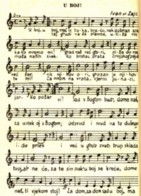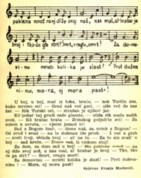Darko Zubrinic, 2005
U boj, u boj
from the opera Nikola Subic Zrinski (1508 – 1566), composed by Ivan Zajc (1832-1914)
It seems that a well known Croatian tune U boj, u boj from the opera Nikola Subic Zrinski by Ivan Zajc is taught in Japanese schools. Information by Mr. Nenad Bach, New York. Professor Vladimir Devidé, outstanding Croatian japanologist (and mathematician), considers this very probable: he remembered a very young boy walking on a Tokyo street Komaba, wearing a huge rucksack filled with books, and whistling the familiar melody - "U boj, u boj"! (this occured in 1961, during his first visit to Japan; personal information, 2004).
"U boj, u boj" for Japanese readers, with historical account, where you can listen to the tune performed by Japanese choir singing in Croatian!
I have noticed that in Japanese sources the song is sometimes interpreted as a Czech folk song, but this is wrong: the song is from Croatia, composed by Ivan Zajc, distinguished Croatian composer. Furthermore, the text of the air is written in Croatian language.
|
|
Provided by Kwansei Gakuin Glee Club, where you can find additional information.
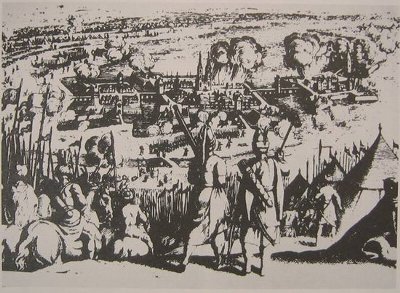

Here is an excerpt from a Japanese web site with parallel Croatian and Japanese texts:
| Zrinski |
ニコラ・シュービッチ・ズリンスキー4世/シゲット城の太守 |
|
| Eva |
エヴァ/ズリンスキーの妻 |
|
| Juranić |
ユラニッチ/イェレナの許婚、太守の信頼厚い青年将校 |
|
| Alapić Paprutović |
アラピッチ、パプルトヴィッチ/共にズリンスキーの側近 |
|
| Časnici i vojnici |
士官・兵士達(男声合唱) |
| <Zrinski>
|
<ズリンスキー> |
| Gle milog sina, ženo! A gdje je nasa kći? |
見よ、我等の息子が来た だが、娘は何処に? |
| <Juranić>
|
<ユラニッチ> |
| Anđelak nam je Jelena! Ispred nas ode gore u vječne Božje dvore. |
イェレナは今、天使となりました! 私達より一足早く天国へ行ったのです |
| <Zrinski i Eva> |
<ズリンスキー、エヴァ> |
| O, Bože, tebi hvala, koj' blago uze nju! |
神を讃えよ、娘の魂を受け入れて下さる様に! |
| <Časnici i
vojnici> |
<士官・兵士達> |
| Stijeg hrvatski visoko se vije! Hrvat rado svoju krvcu lije Za kralja, rod i dom! |
フルヴァト(現クロアチア)の旗が天高く舞っている! フルヴァトはもはや戦闘準備が整った、 王のため、一族のため、家のため! |
| <Zrinski> |
<ズリンスキー> |
| Sad naprijed, braćo, vec zove bijesno Ture! Ti, Juraniću, nosi Zastavu, ja za tobom, a za mnom ti, a tada Alapić! Ali prije nego izginemo, hajd'mo braćo, da se zagrlimo! (Časnici se okupe; on se grli i rukuje s njima.) |
前進せよ、兄弟よ 猛り狂ったトルコ軍が誘っている! ユラニッチ、軍旗手を務めよ 我もその後に続こう アラピッチも続くぞ! だが我らの宿命を迎える前に 集え、兄弟よ、いざ抱擁を! (士官達が集い、ズリンスキーは皆と抱擁し手を握り合う) |
| <Juranić>
(digne zastavu) |
<ユラニッチ> |
| U boj, u boj! Mač iz toka, bane, nek dušman zna kako mremo mi! |
突撃、突撃だ 剣を執れ、君主よ 敵に示さん 我等が死に様! |
| <Zrinski, Alapić,
Paprutović, Eva, Časnici i vojnici
> |
<ズリンスキー、アラピッチ、パプルトヴィッチ、
エヴァ、士官・兵士達> |
| Grad nas već gori, stiže do nas već zar: rik njihov ori, bijesan je njihov jar! |
街は既に戦火に喘ぎ 熱風既に我等に届く 我等が喊声四囲に響き 彼等が怒り狂わんばかり |
| <Juranić> |
<ユラニッチ> |
| K'o požar taj grudi nase plamte, utisa rik mača nasih zvek! |
街を焦がす業火の如く 我等が胸も燃え盛る 我等が高揚の声高けれど 剣戟の響きこれに勝る |
| <Juranić, Zrinski i
zbor> |
<ユラニッチ、ズリンスキー、合唱> |
| K'o bratac brata Zrinskog poljub’te svi! Zrinskom na vrata, vjerni junaci vi! |
皆の者 同じ腹の兄弟として ズリンスキーに接吻し ズリンスキーに続け 城門に向けて 頼もしき汝ら勇士 |
| <Zbor> |
<合唱> |
| Sad, braćo! Pun'mo puške, samokrese, nase grome, naše trijese, neka ore, ruše more! Brus'mo ljute naše mače, neka sijeku jače, jače! |
さあ兄弟よ 銃砲に装填だ 我等が雷 我等が稲妻の響き渡りて 敵を打ち砕くように 剣を磨け いよいよ鋭く 首級を挙げん |
| < Eva, Juranić,
Paprutović, Zrinski> |
<エヴァ、ユラニッチ、パプルトヴィッチ、ズリン
スキー> |
| Sad zbogom bud', dome nas zauvijek, oj, zbogom, od svud i svud na te dušman ide prijek. I vec u grob sveti trup sklada tvoj, al' neće! Za te sin svak u boj se kreće! Dome nas, ti vijekom stoj! |
これでお別れだ 我等が祖国よ さあ 永遠にお別れだ 十重二十重と群敵は祖国を襲い 聖なる祖国は絶命に喘ぐ だが 民衆はそうはさせじと突撃す 我等が祖国よ永遠なれと願いつつ |
| <Svi> |
<全員> |
| Hajd' u boj, u boj! Za dom sad u boj! Ma paklena mnoš na nj diže svoj nož; Hajd' u boj! Nas mal, al' hrabar je broj! Tko, tko će ga strt'? Smrt vragu, smrt! |
いざや突撃 突撃だ 祖国の為突撃だ 兄弟よ 祖国の為突撃だ 血に飢えた敵が祖国を威す いざ突撃だ 精鋭少数の我等 我等を滅ぼす怨敵に 死を 死を |
| <Zrinski> |
<ズリンスキー> |
| Za domovinu mrijeti kolika slast! |
祖国に殉ずる死の心地良さ |
| <Svi> |
<全員> |
| Prot dušmaninu! Mora on past'! |
敵を道連れにして彼等ももはや死を逃れられぬ |
| (Svi odu) |
(全員舞台を去る) |
| Katastrofa |
(劇終末) |
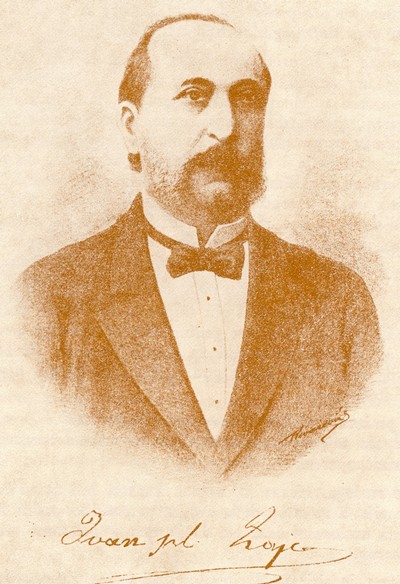
Ivan
pl. Zajc (pl. = plemeniti =
noble), composer of the opera Nikola Subic
Zrinski (1508
– 1566);
libretto by Hugo Badalić, based on drama Zriny
written by a German poet Theodor Korner (1791-1813).
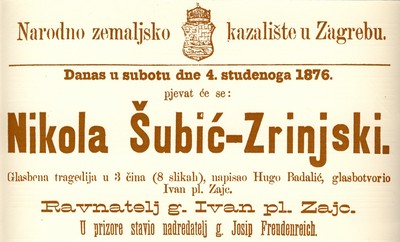
Announcement of the premiere of the opera Nikola Subic Zrinski in Zagreb, 1876
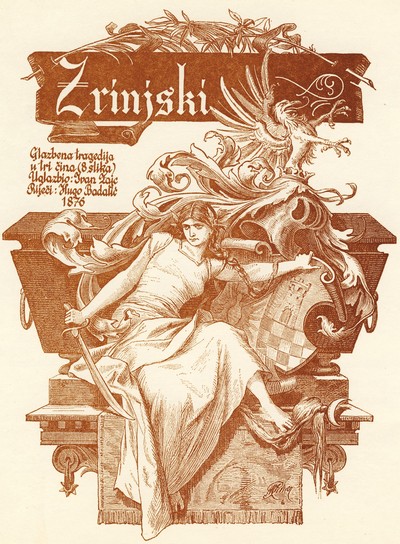
From
the announcement of the premiere of the opera Nikola Subic Zrinski,
Zagreb 1876.
Note the Croatian
Coat of Arms on the right.
The music for "U boj, u boj!" was composed by Ivan Zajc already in 1866 in Viena, Austria, for a quartet composed of Croatian students in that city. Later, when he lived in Zagreb, he incorporated this song into his opera "Nikola Subic Zrinski" in 1876. Many thanks to maestro Josip degl'Ivelio, Zagreb, for this information.
U BOJ, U BOJ - music score (pdf), edited by Maestro Youichirou Fukunaga
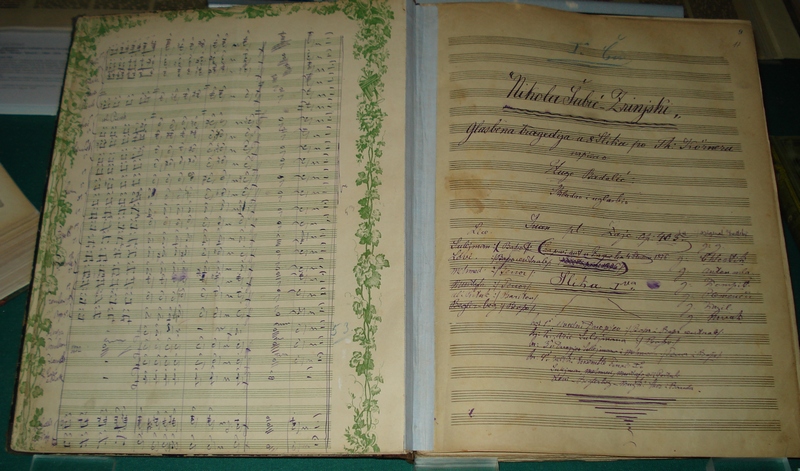
Music
score of the opera
Nikola Šubić Zrinski from 1876, written by Ivan pl.
Zajc,
kept in the National and University Library in Zagreb.
U boj - music score edited by Dr Bozidar Sirola:
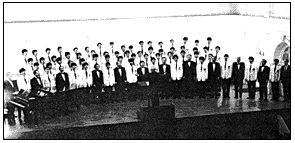
A Japanese choir singing "U boj, u boj" 1989; source: U Boj Story
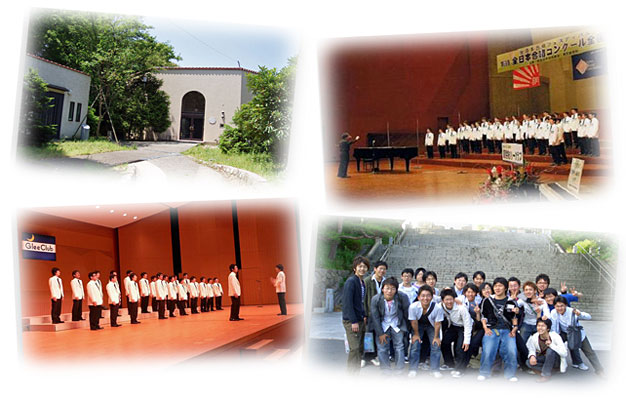
Japanese
choirs singing "U boj, u boj"; source www.kg-glee.gr.jp
many thanks to Professor Yoshinori Kametaka, Kyoto, for his kind
information
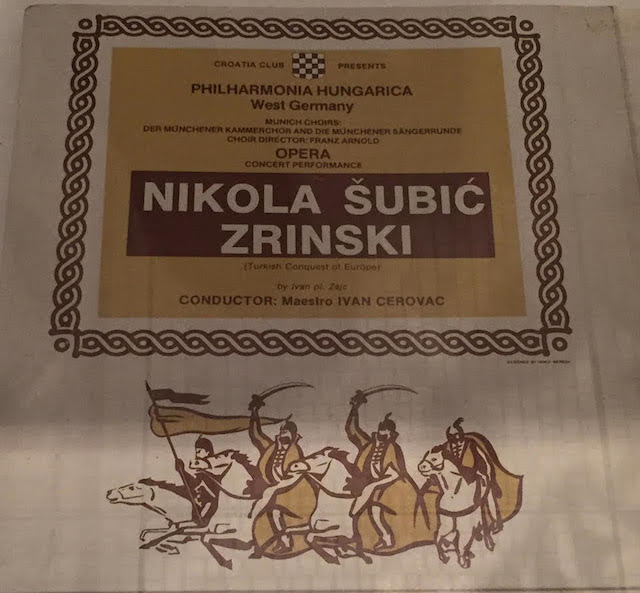
Croatian Club presents
Philharmonia Hungarica
Munich choirs
Opera concert performance
Nikola Šubić Zrinski
(Turkish conquest of Europe)
by Ivan pl. Zajc
conductor maestro Ivan Cerovac
(Zagreb City Library)
U boj, u boj - A choir of 1000 Japanese singers, conducted by Katsuaki Kozai, singing in Croatian, in Kokugikan Hall in Tokyo, 2006, in front of about 10,000 listeners!
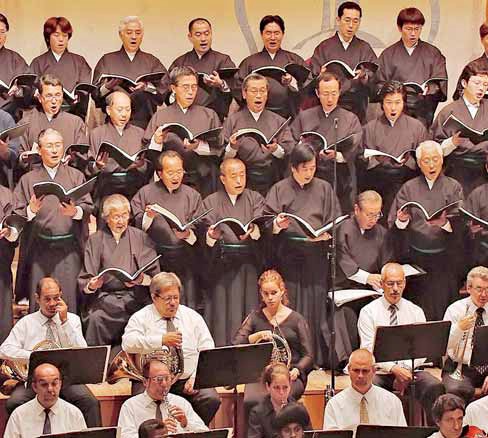
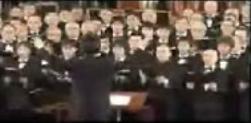 |
 |
 |
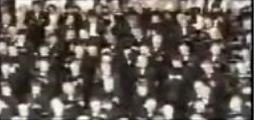 |
 |
 |
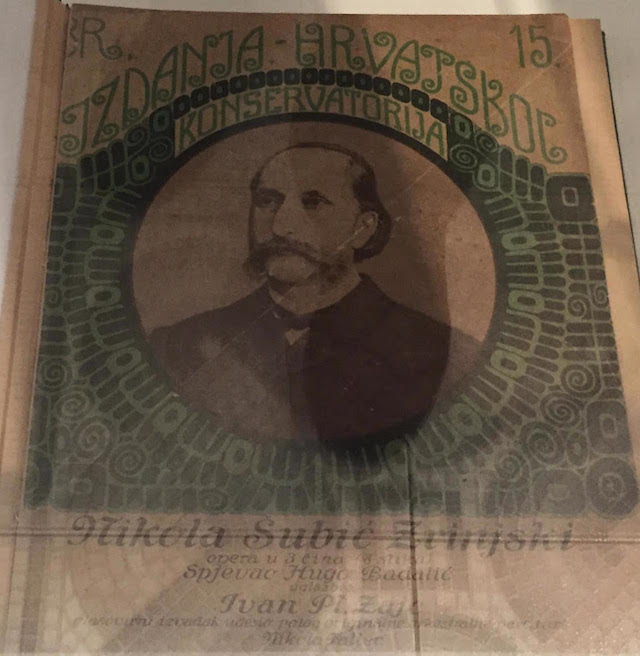
Nikola Šubić Zrinjski
opera u tri čina
Ivan Pl. Zajc
(Zagreb City Library)
関西学院グリークラブ欧州演奏旅行1981(22) 最後の"U Boj"
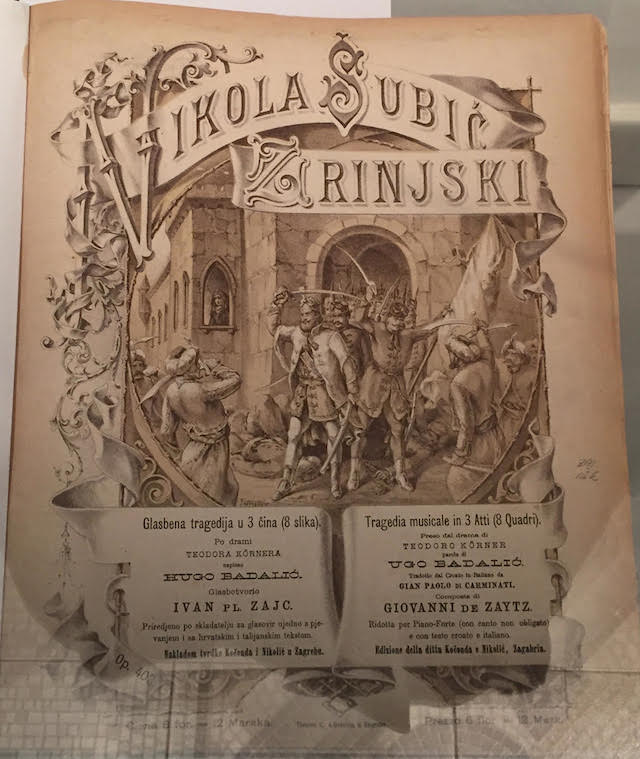
Nikola Šubić Zrinjski
Music tragedy in three parts
Ivan pl. Zajc, Zagreb 1923.
(Zagreb City Library)
U boj, u boj!
Male chorus glee club, 9th July 2006, Toyohashi city, Japan.
Almost "Funken glee club" members live in Toyohashi near Toyota city (famous for Toyota car construction).
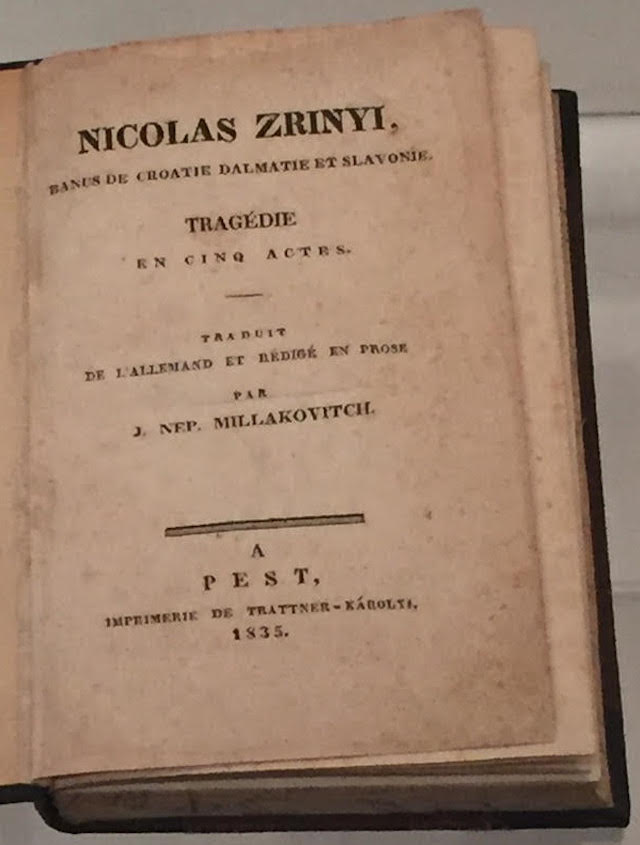
(Zagreb City Library)
The following photos are from http://members.at.infoseek.co.jp/mannel/uboj.html
At
the beginning, the large Okayama Choir gave a joint concert of three
smaller groups of singers,
which prepared their programme during the previous year each.
The above sentence and the
titles that
follow are obtained by automatic Japanese - English Google translator.
It seems that in Japan there exists U
Boj Choir!
| Lions club 50th anniversary commemoration concert (2006) |
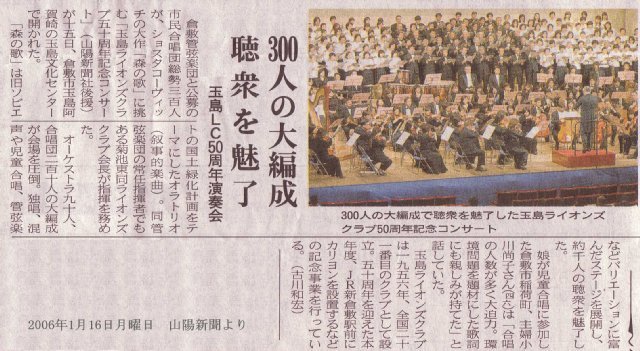
Three choruses and Kurashiki orchestra; an article by the Sanyo newspaper
| 58th Okayama prefecture chorus festival (2005) |
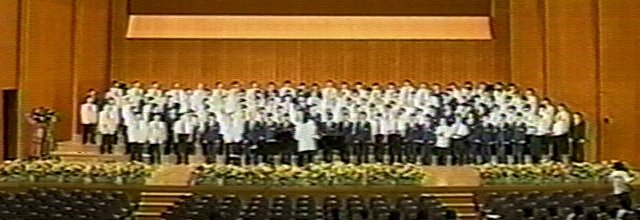
| 57th Okayama prefecture chorus festival (2004) |
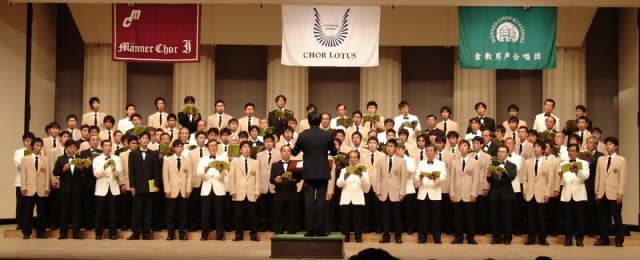
Kurashiki Male Choir, Choir Lotus, Male Flannet (?) Choir
| Okayama prefecture chorus festival (2004) |

Kurashiki Male Choir, Choir Lotus, The Okayama University Glee Club
| Okayama prefecture chorus festival (2003) |
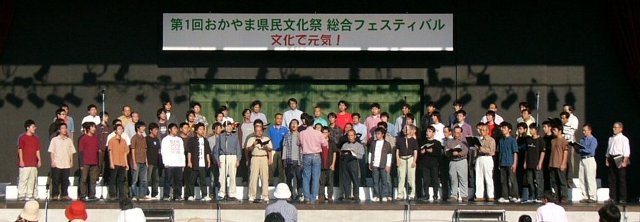
| Okayama prefecture chorus festival (2003) |

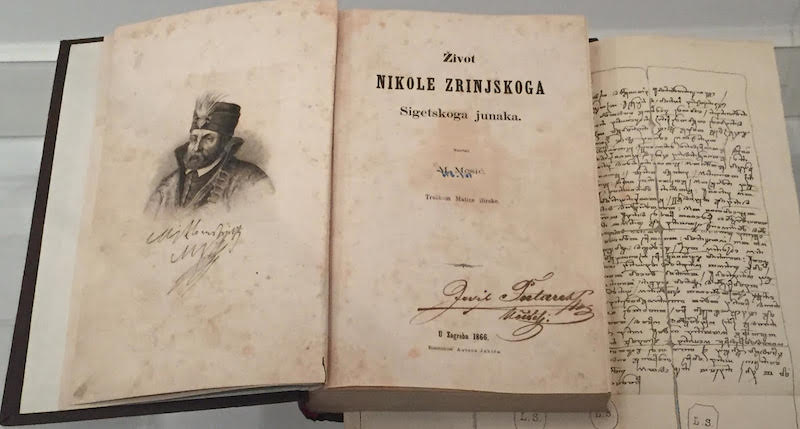
Matija Mesić: Život Nikole Zrinjskoga,
Sigetskog junaka (The
Life of Nikola Zrinjski, The Siget Hero), Zagreb 1866.
Attached is a document in Croatian
Glagolitic quickscript. (Zagreb City Library).
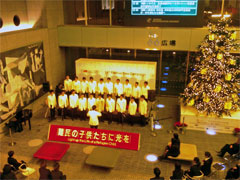
December 8, 2007, Tokyo, OAZO, Waseda University Glee Club singing U BOJ, U BOJ at the charity concert for refugee children. Source durianjp.com.jp
Vice
Vukov, Croatian pop singer, accompanied with tamburitza
players
in the Vatroslav Lisinski Concert Hall, Zagreb 1989
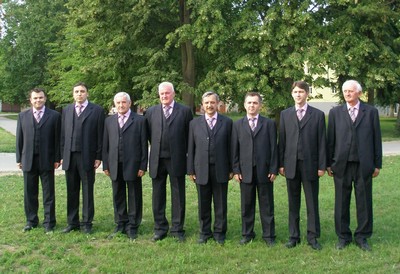
Lipa male choir from the town of Vinkovci, Croatia, was singing U boj, u boj in the Trogir Cathedral in 2008, [MP3]
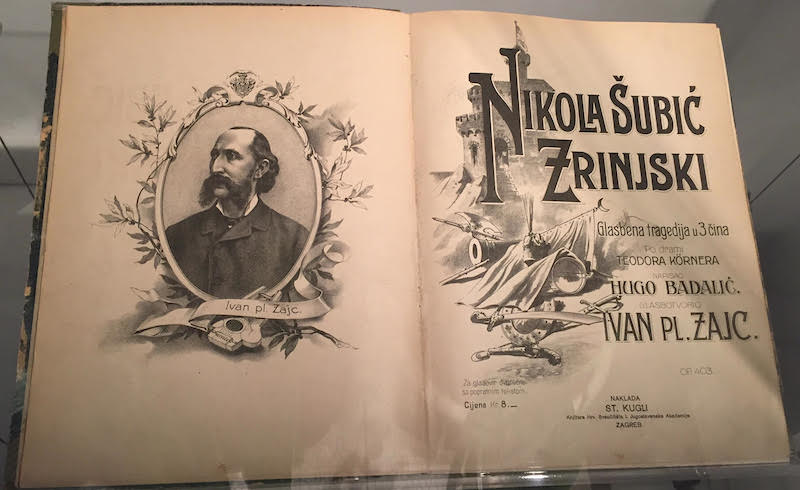
Nikola Šubić Zrinjski, Glasbena
tragedija u 3 čina (Music tragedy in three parts), written by
Hugo Badalić,
composed by Ivan pl. Zajc, Zagreb (Zagreb City Library)
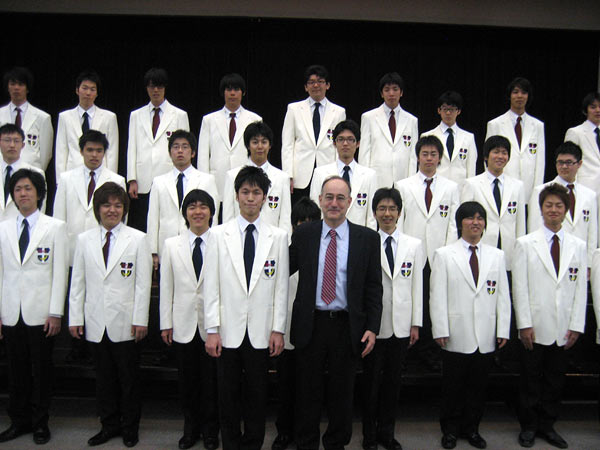
Dr. Drago Stambuk, Ambassador of Croatia to Japan, with Kwansei Gakuin Glee Club in Kobe in 2008, one of the best male choirs in Japan. About fifty singers sang "U boj, u boj" in front of the main building of the University of Kobe in honour of Mr. Stambuk on the occasion of his visit to the University. As a rule, Kwanesi Gakuin Glee Club choir always finishes public music performances by singinig "U boj, u boj", and this song is their trademark. For more information see www.croatia.org.
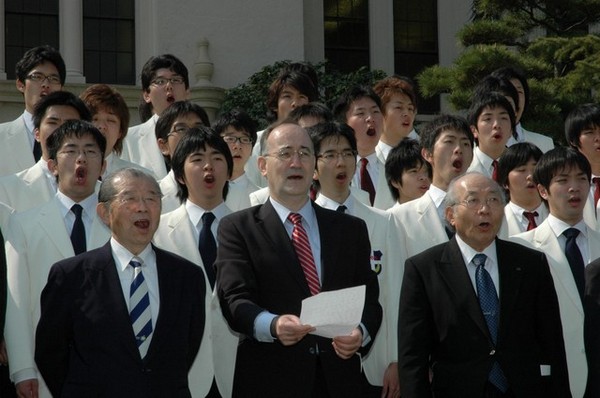
Dr. Drago Stambuk, Croatian ambassador to Japan, singing "U boj, u boj" with the Kwanesi Gakuin Glee Club choir in 2008, during an official visit to the Kwansei Gakuin University in Kobe. For more information see www.croatia.org.
Los
Angeles Men's Glee Club sings U
Boj!
at Croatian Cultural
Extravaganza, Warner Grand
Theatre, San Pedro, California, USA
"L.A. Men's Glee Club" has a website: www.laglee.org. Many thanks to Ms Heidi Granic, director of St Anthony's Tamburica & Kolo Club Croatia in Los Angeles, and to Nenad Bach.
Nikola Subic Zrinjski - finale U boj
Croatian tenor Sasa Jakelic as Lovro Juranic and baritone Sinisa Hapac in Nikola Subic Zrinjski at HNK [Croatian National Theatre] in Split 2007, Croatia
Nikola Subic Zrinjski - finale U boj (excerpt)
Opera Nikola
Šubic Zrinski -
Ivan Zajc
Croatian National Theatre, Zagreb, May 30 1990.
The impetus for creating this web page came as a result of the request of Maestro Kunimasa Katayama from Japan, asking Mr. Nenad Bach for music score and CD of "U boj, u boj" for the male chorus in Tokyo that sings this song under his guidance. We have obtained an e-mail by Mr. Katayama in July 2005, containing very intersting information about the interest for "U boj, u boj!" in Japan (boldings and links are mine, D.Z.)
Dear Professor Darko Zubrinic, Zagreb
Daer Professor Mirna Potkovac-Endrighetti, Skrljevo
Dear Mr. Nenad Bach, New York
Dear Mr. Jun Karube, KawanishiThank you very much for your kindness to help me. I had already known the home page of Kansei Gakuin Glee Club and Waseda University Glee Club.
The history of "U boj, u boj!" being written in the home page of Kansei Gakuin Glee Club is well known in Japan. This "U boj, u boj!" were being sung among many many male choir student and people from young to old more than half a century in Japan.
We Coro Maschile ROPPONGHI are also singing this "U boj, u boj!" as one of the favorite songs. But in Japan there are several versions of this "U boj, u boj!". We are using now attached version score (PDF) edited by Maestro Youichirou Fukunaga who died about ten years ago. There are some differences of text and score between some versions in Japan. Then I asked to Mr. Nenad Bach to help me to obtain the opera score and CD to know the most original and most true text, score and playing sound.
The representative of Coro Maschile ROPPONGHI is Mr. Shigeaki Saegusa who is a famous composer in the world, and the laurel conductors are Maestro Hiroyuki Iwaki and Maestro Naoto Ootomo both are famous in the world as you know, and the chorus master is Maestro Hiroshi Misawa who is the choir supervisor of National Opera Theater. So we would like to play more original "U boj, u boj!" by true text at any chance in near future.
Best regards,
Kunimasa Katayama
I express my deep gratitude to Japanese colleagues who prepared a beautiful web page devoted to Nikola Subic Zrinski and his samuraian death in 1566 while defending the fortress of Siget.
In August 2005 Croatia has been visited by prof.dr. Teruhiko Awakura, Tokyo University of Agriculture, Faculty of Bioindustry, upon invitation of dr. Emin Teskeredzic from Rudjer Boskovic Institute, Zagreb. In the introduction to his lecture he said that his most favorite song is "U boj, u boj!". According to his information, the song came to Japan already in 1919. The song came after the WWI, when Czechoslowakian army [in fact, Austrian-Hungarian army, D.Z.] moved from Siberia to their country, and their ship stranded near Shimonoseki southwest of Honshu, Japan, in 1919. During the repair of their ship they stayed in Kobe, near Osaka, for about two months. During that period they exchanged courtesies with the members of glee club of Kansaigakuin Universty and when they left Japan, they presented the handwriting score of "U boj, u boj!". It was believed that the song was the Czechoslovakian song [Czechoslowakia did not exist at that time, and Czechs do not have a sea; Austrian-Hungarian crew was obviously composed mostly of Croatian mariners, D.Z]. The song soon extended to other glee clubs of Japanese Universities. In conclusion to his lecture he said:
When I was a university student, I took part in glee-club and we sang "U BOJ!" many times. From 1993, I am taking part in "Sapporo Male Choir" and also sometimes we are singing "U BOJ!".
Listen to very beautiful recording of U boj, u boj! sung by Japanese choir where professor Awakura is singing (in Croatian!).
Many thanks to dr. Ivancica Pizeta, Rudjer Boskovic Institute, for this information and for ppt file of prof. Awakura's lecture.
It is worth mentioning that in September 2005 the Zagreb Philharmonic Orchestra had a series of concerts in Japan. Especially successful was the concert held in the hall of the Tokyo opera, named Memorial Takemitsu in honour of a famous Japanese composer. The programme included "U boj, u boj", but this time sung also with participation of singers from an amateur choir from the Tokio district of Roppongi, who expressed their wish to sing together with Croatian Philharmonic Orchestra. It was a moving gesture of Japanese singers who sang the song in Croatian, and a great honour for Croatian orchestra.
A Japanese choir composed of 1000 singers conducted by maestro Katsuaki Kozai sang "U BOJ, U BOJ" in the Kokugikan Hall in Tokyo in February 26, 2006, watch and listen to YouTube. This concert attended by about 10,000 listeners has been organized among others by Croatian embassy in Japan. In the introduction to the concert it has been said that this very popular tune was brought to Japan by Croatian mariners (then within Austrian-Hungarian army), immediately after the end of the WWI. Namely, while retreating from the Russian Far East front, a taifoon carried their ship to Japanese coast near Kobe. The Japanese liked very much "U BOJ, U BOJ" sung by Croatian mariners, and since then it became very popular throughout Japan.
Darko Zubrinic, 2005
Japanese male choir
This a tribute to Nikola Šubić Zrinski, a great Croatian hero who deserves more appreciation in our country. Tip: read quickly! Nikola Šubić Zrinski or Miklos Zrinyi (in Hungarian)(1508--1566) was a Croatian soldier in service of the Habsburg Monarchy and member of the Zrinski noble family. He distinguished himself at the siege of Vienna in 1529, and in 1542 saved the imperial army from defeat before Pest by intervening with 400 Croats, for which he was appointed ban of Croatia. He later beat the Turks in the Battle of Babócsa and the Battle of Somlyo. Zrinski resigned as ban in 1561. In 1566, from August 5 to September 7, his small force (2,300 soldiers) heroically defended the little fortress of Siget against the Turks (90,000 soldiers and 300 cannons), led by Suleiman the Magnificent in person. The Croatian forces of Zrinski repulsed 3 all-out Turk assaults for several weeks. Despite their inferiority, the imperial army did not send them any reinforcements. After days of bloody struggle, the defenders retreated into the Old City; with the majority of Croats already dead, this was their last stand. The Turks tried to lure Zrinski into submission, offering him rule over all of Croatia but to no avail. Zrinski said: "nobody will point his finger on my children in contempt." During the Siege Suleiman died on 7th September. But the news was kept secret so that it would not ruin morale at the end of the siege. The next day the final battle was conducted. The castle of Siget was burnt down to ruined walls and the all-out attack by the Turks began who swarmed against the Old City, drumming and yelling. Zrinski prepared for the last charge, addressing his men: "..Let us go out from this burning place into the open and stand up to our enemies. Who dies - he will be with God. Who dies not - his name will be honoured. I will go first, and what I do, you do. And God is my witness - I will never leave you, my brothers and knights! Zrinski led an exit force of 600 troops from the castle. He was heavily wounded at his chest and his head by Turkish bullets. At the end, his dead body was beheaded. The Turks took the fort and effectively won the battle. Only 7 defenders managed to get through Turkish lines. The Turks suffered heavy losses, estimated at 18,000 cavalrymen and 7,000 elite janissaries and several high-ranked officers. Croatian composer Ivan Zajc created a masterpiece opera titled Nikola Šubić Zrinski which debuted in 1876. It is a patriotic play which depicts the heroic Croatian struggle against the Turks. It is still in production today. A square surrounding a large park in the center of Zagreb is named after N. Š. Zrinski, commonly known as Zrinjevac. Check out wikipedia for more information on him and the battle of Siget (Szigetvar- in Hungarian including the text of the last part('U boj') of the opera ''Nikola Šubić Zrinski'' which is also the bacground music of my movie.
World champions 07/20/2008
Brodosplit male choir from Split, Croatia, world champion at the 5th World Choir Games in Graz, Austria 2008, in the category of male chamber choirs.
Klapa Škrljevo singing in Pazin
Krakow Male Choir, Poland, singing "U boj, u boj!", translated into
Polish.
Povijesno surječje (historical context, in Croatian)
U BOJ, U BOJ ~ Mješoviti zbor HRT-a & 160
tamburaša
• Šokačka rapsodija 2006.
Song lyrics at http://www.justsomelyrics.com/1533500/U-Boj,-U-Boj-Lyrics
Klapas Kastav and BA from Croatia singing in Buenos Aires, Argentina.
Many thanks to Mr. Joza Vrljičak, Buenos Aires for this information.
Jedan od najprestižnijih japanskih fakulteta ima muški zbor
Glee
club čija je himna poznata arija iz opere 'Nikola Šubić
Zrinski'!
Hrvatska arija imena 'U boj, u boj', uzeta iz opere 'Nikola
Šubić Zrinski' himna je prestižnog japanskog fakulteta
Kwansei
Gakuin.
Muški zbor Glee club pjeva ovu ariju na hrvatskom od 1919.
do
danas. Zahvaljujem dr. Bruni Blaškoviću na informaciji o
ovom
filmskom zapisu.
U boj! Kwansei-Gakuin Choir in Zagreb, Croatia, 11th September 2014.
“U boj, u boj”, a famous air from the opera
“Nikola
Šubić Zrinski” by Ivan pl. Zajc is already since
1924 (!)
the official anthem of the Japanese male choir Shingetsu-kai from the
Kwansei Gakuin University.
Japanese singers, former students of that university, sang it in
Croatian language on 11th September 2014 at 2PM at the Oktogon passage
in the center of the city of Zagreb. Registered by Daniel Hofman, FER,
University of Zagreb.
Some Japanese choirs sing "U boj" in Japanese translation from Croatian:
O, MARIJANA, a well known Croatian tune by Vlaho Paljetak, sung in Japanese and Croatian by Seiji Tanaka in 1976.
Glagoljicom pisani zapis Franje Črnka o bitki kod Sigeta 1566. i o Nikoli Zrinskom
Croatia - its History, Culture and Science
